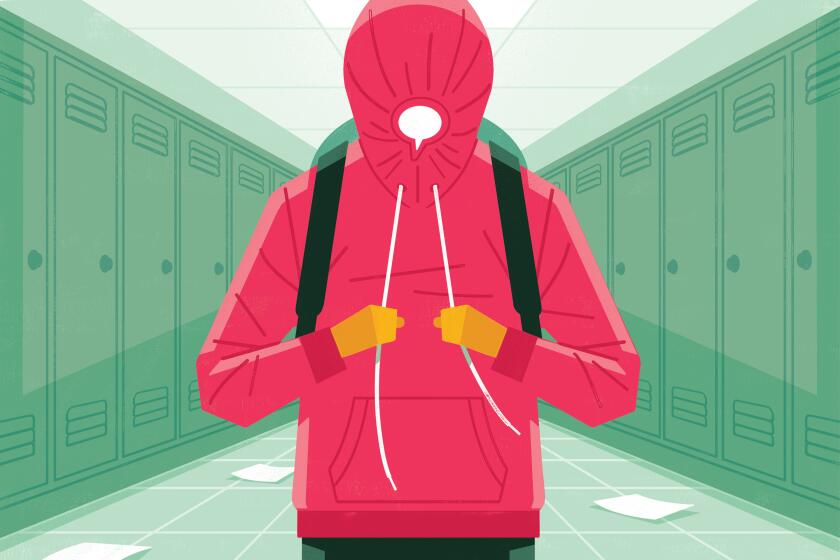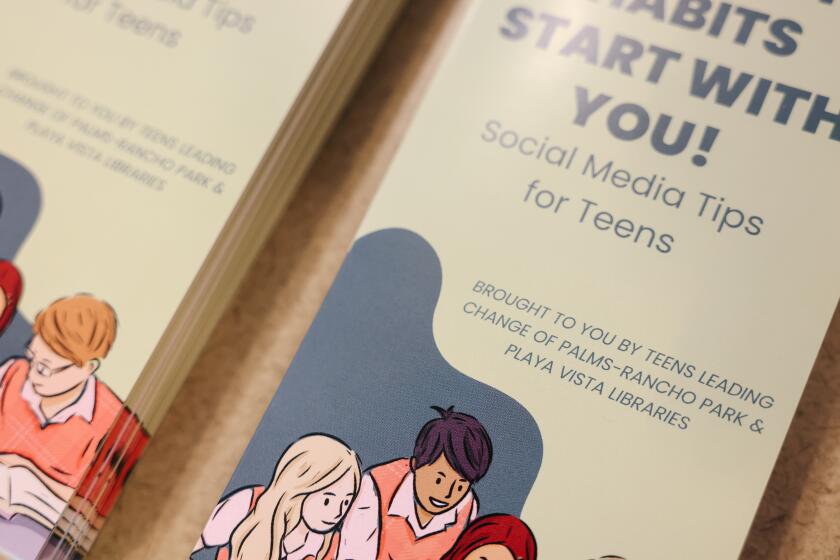(Karlotta Freier/For The Times)
- Share via
This column is the first installment in a new series on parenting children in the final years of high school, “Emptying the Nest.”
When I was younger, one of my most hideous dreams involved being informed that my college degree and subsequent career had been rendered null and void because, through some administrative snafu or other, I had neglected to graduate from high school. So I would have to go back.
Invariably, I would wake screaming.
At the time, I dismissed these as anxiety dreams. Now, as a parent, I know better: They were divinations.
While many people love to alert new parents about the changes to come — ”say goodbye to sleeping,” “hope you don’t have a problem with vomit” — most are too kind to reveal the biggest trauma involved: “Have fun going back to high school.”
More specifically: “Have fun surviving junior year.”
Now that gaining admission to many colleges, including most branches of the University of California, requires the kind of competitive credentials more normally associated with getting a co-op in Manhattan, junior year has become the Slough of Despond for students — there is a way through, but any misstep sends you right back into a depression.
For parents, it is equally frustrating. The third year of high school marks the beginning of the end, the countdown months — in less than two years, your child will be graduated and gone. So you actually want to enjoy it.
Except that’s impossible. Because even for parents, junior year is the worst. At precisely the time you should be wanting each day to stretch long, to savor each moment with your child, you instead find yourself wishing your child were in college already. Because at least then they might have some free time.
And you could let your shoulders unclench for five minutes.
Just when my friends and I should be exploring many perspectives and figuring out where we stand, we’re self-censoring and following familiar scripts.
A teeter-totter of freedom and dependence, junior year is a step into adulthood that somehow requires more parental focus than kindergarten. Forms that once came home from school in folders, or via email, are now handed to you by your child, often with just the signature line visible as if she were some unscrupulous relation trying to get you to sign a new will. Your signature is needed but not necessarily your input.
Except when you are suddenly told your presence is required that very night to take tickets or man the concession stand.
Reminders about the perils of alcohol, drugs and unprotected sex become a ritual mortification (with the recent added bonus of repeating the word fentanyl on a weekly basis), as do frequent nudges that they need to start making a list of colleges that they are interested in (while you secretly make lists of those you can actually afford).
The financial demands are endless: Another fundraiser? Another pair of shoes? The tickets are how much? You need more coaching in what, because why? And didn’t you get a job so you could pay for some of this yourself?
Not that these questions can be answered coherently. Your average high school junior is so stressed out by academic, extracurricular and social demands, not to mention the fact that every adult has begun asking where they want to go to college, that they are consistently one breath away from a crying jag, a temper tantrum or a full emotional shutdown.
Recently, there has been a lot of concern about the declining mental health of teens. Is social media to blame? Lack of sleep? Our increasingly divisive culture? Perhaps. But even the most mentally stable 16- or 17-year-old is hormonally conditioned to worry: About how they look, how they act, what they say, what other people say. About how they seem to other people, how other people seem to them, who they are and where they fit in.
And this, for reasons I will never understand, is the moment our education system chooses to make the most intense, time-consuming and potentially far-reaching demands of them. Of course 16/17 is the perfect time to choose which expensive college will help propel you to the profession you think you might like! Of course it’s the ideal moment to showcase yourself as an athlete, scholar or artist deserving to be drafted or underwritten! Of course you know exactly who you are and what you’re capable of and want to make choices based on that knowledge that will shape your future!
Ha. The average 16/17-year-old is so tightly wound with reversed polarities that the whole joint could blow at any time. Then junior year comes along and strews the floor with trip wires that forces entire families to navigate them all in a fog of perpetual exhaustion and hastily prepared and erratically timed meals.
Even the high points (she can drive!) come fully equipped with worry (should she drive? All that way? By herself?)
Adolescents who have dealt with cyberbullying and body dysmorphia due to their time spent online offer tips for their peers on how to navigate these spaces.
As with childbirth, you forget just how terrible it is until you’re smack in the middle of it. My third and final child made it through the mess of Zoom learning in middle school, returning to the classroom after a year-and-a-half absence to find herself in high school. Even so, everything was going fine until, bam, welcome to 11th grade and everything you have to do in a 10-month period to ensure you are on track for the rest of your life.
But there’s a back-to-school carnival and a homecoming dance so don’t forget to have fun!
No doubt there are countless families who fly through junior year. And I realize I am speaking from my own experience, which includes a fair amount of privilege. My child goes to a public school with resources and her family has attended college for at least two generations. Her expectations, hopes and dreams, like those of her older siblings, are high and wide-ranging because they are allowed to be high and wide-ranging.
Even so, whatever relief there might have been in joining high school’s “upper class” was quickly doused by school schedules that often seem in direct opposition to the laws of nature and physics.
I mean, do you really need to eat? Or sleep? Wouldn’t you rather sign up for another club to round out your résumé?
In case you were wondering, my husband and I have never pushed our kids to get into some super-competitive, Top 10, Ivy League school. (Though I value a college education, I do not value it as much as my house.)
But even those hoping to attend the University of California of their choice need a GPA that hovers near, and preferably above, a 4.0. Despite what you might have heard about grade inflation, this kind of GPA is difficult to achieve and almost always requires taking a range of Advanced Placement classes. (Fees for AP tests are essentially another tax California residents pay for their kids to get into a UC.)
Many of these classes appear designed to prepare students for said tests, rather than, you know, teaching them anything that might be worth knowing. While also forcing them to weep over outlines and online tutorials at least three nights a week.
And by “nights” I mean after 10 p.m. Three or four hours of homework/studying is the baseline in our house and meetings, practices or rehearsals often keep kids at school until 6 or 7.
A generation ago, 60 was a milestone many women would not admit to, for good reason. Now it’s just another year in a life.
Because junior year also means getting serious about extracurricular activities. Not just participating in sports, artistic performances, school clubs and community-based service, but also holding some kind of office while doing so — captain, president, founder, Head of the United Nations.
College résumés these days apparently need to reflect the breadth and depth of interest, achievement, rigor and commitment historically reserved for the obituaries of long-lived Nobel Prize winners. (With the result that by the time they get to college, students are too tired to do anything but barely make it to class.)
And then there are the tests. Not just the AP exams and regular standardized testing, but also the PSATs. The results of which are guaranteed to leave most college-hopeful students, and anyone in a two-mile radius of them, in a state of despair while their parents comb the Internet for prep classes and wonder what, exactly, they are teaching in all those AP classes.
I get that we want to prepare young people for the challenges of college and the realities of adult life. I get that America is built on competition — and all the expensive support systems designed to provide those who can afford them with an edge. I have always wanted my children to work hard, do their best and feel the satisfaction of having done so.
But wouldn’t it be nice if we were teaching them to love learning, rather than keeping them up nights worrying about endless quizzes? Couldn’t advanced classes delve deeper instead of trying to cover more, faster, with an eye to how many students can test well enough to get college credit? Do they really need to fill every minute of the day with some activity that can be mentioned on a résumé?
It’s as if junior year were some awful game show in which your kid is given a shopping cart and three minutes to fill it with as much stuff as she can cram in. And in case you think I’m blaming teachers, I’m not. They are as rushed off their feet by the system as the students.
Obviously, there are many lovely moments in 11th grade— dances, parties, performances, great days at school, hang-outs with friends, pride of achievement. And like the German, French and British soldiers who climbed out of the trenches to celebrate the Christmas Day Truce of 1914, we try to enjoy them.
Because it’s only going to get worse. We haven’t even started the whole college selection, tour and application process, which inevitably leaves every family feeling, at least until the first acceptance letter arrives, as if their very souls had been sucked from their bodies.
Already my daughter is worrying about the dreaded essays, which usually boil down to explorations of obstacles overcome or new insights revealed. Surviving a deadly pandemic and all that went with it will not, I have been informed, cut it. “Mom,” she has said in exasperation on more than one occasion, “everyone is going to be writing about COVID.”
Honestly, I think she should just write about surviving junior year.
More to Read
The biggest entertainment stories
Get our big stories about Hollywood, film, television, music, arts, culture and more right in your inbox as soon as they publish.
You may occasionally receive promotional content from the Los Angeles Times.














